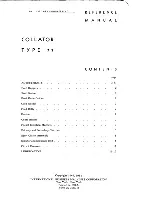
Adjustments should be made with the HVAC system on so that the installer will be able to de-
tect the effect of airflow on the operation of the WIR-10-SR-C-D. Use only insulated tools to
make adjustments. Immediately after applying power to the lighting circuit, wait approxi-
mately two minutes for the switch to power up
and stabilize.
Self-Adjust
The sensor is shipped in self-adjust mode. This
applies to Time Delay and PIR sensitivity. In
preparation for the Installer Test, the Time
Delay is set to 15 seconds, after the sensor is
installed, powered on and has stabilized, the
unit will Time-out 15 seconds after the last mo-
tion detected. Coverage and sensitivity can be
confirmed by watching the Red (PIR) indicator
LED on the front of the sensor, while moving
around the room.
1. Walk around the room and monitor LEDs.
2. Stand in different parts of the room and
wave your hands. LED should only turn on
for one second with each motion. (If LED
does not turn on, go to Installer Adjustments – Sensitivity Adjustment Section)
3. Stand still three to four feet away from sensor for five seconds. LED should not turn on.
(If LED turns on, go to Installer Adjustments – Sensitivity Adjustments section)
4. Walk outside the room and wait 15 seconds for the lights to turn off. (If lights do not turn
off go to Installer Adjustments Section)
5. Re-enter the room to activate sensor. (If lights do not turn on go to Troubleshooting Sec-
tion)
6. At this point you can exit the room and let the sensor Time-out. When the sensor times-
out and is off for five minutes, the unit will go to a 10 minute Time Delay user mode set-
ting.
Note: To place i nto Test Mode, toggle DIP Switch 8 out of its current position, wait 3 seconds,
and then back into its original position.
Checkout and Adjustment
Installer Adjustments
Manufactured for GE Lighting
General Electric Company
Nela Park Cleveland, OH 44112
1-877-584-2685
www.gelightingcontrols.com
© 2011 GE
PIR Sensitivity
1. Stand in different areas of the room and wave your
hands.
2. If the Red LED does not turn on, check for any obstruc-
tions.
3. Stand still three to four feet away from sensor for five
seconds. LED should not turn on.
4. If Red LED turns on without motion or is constantly on
adjust PIR sensitivity to 50 % by moving DIP Switch 5 up.
ON/OFF Disabled Feature
1. ON/OFF Button Disable Option – When selected this op-
tion disables the ON/OFF button and sensor becomes
automatic only control regardless of the setting for au-
tomatic or manual activation. This feature will not
allow someone to turn light(s) OFF via the Pushbutton
while people are in common areas such as restroom,
break room, and copy room areas.
Field-of-view outside the space
1. Adjust PIR sensitivity to 50 % by moving DIP Switch 5 up.
2. Use non-reflective tape strips to cover the portions of the sensor lens that view outside
the space.
Daylight Adjustments
The daylighting feature prevents the lights from turning ON when the room is adequately illu-
minated by natural light. If there is enough light in the room regardless of occupancy, the sen-
sor will hold the lights OFF. If there is not enough light in the room, the sensor will allow the
lights to turn ON when occupied. The sensor will not allow the daylighting feature to turn the
load OFF until the space is vacant or the light level rises above the setpoint and the Time Delay
expires. While in Manual Activation Mode, if someone attempts to turn the load ON and there
is sufficient daylight available the Daylighting feature will hold the lights OFF.
Set the light level when the ambient light is at the level where no artificial light is needed. If
this feature is not needed, leave the light level at maximum (fully CW).
1. With the load(s) ON, put the sensor into Test
Mode. To place into Test Mode, toggle DIP
Switch 8 out of its current position, wait 3
seconds and then back in to its original posi-
tion.
2. Set the Light level to minimum (fully CCW).
3. Let the sensor Time-out so lights are OFF.
Enter the space and lights should remain OFF.
4. Make sure not to block the sensor from the
daylight source and adjust the light level po-
tentiometer CW in small increments. (Pause 5 seconds between each adjustment)
5. Once the lights are ON, the load connected to the sensor will not turn ON if light levels are
above the current illumination.
Time Delay Adjustments
People who remain very still for long periods of time may need a longer Time Delay than the
default setting of 10 minutes. As long as the self-adjusting feature is enabled, the switch will
respond to each pair of False-offs with no normal OFF in between, by alternately making slight
adjustments to either Time Delay (by 2 minute increments) or sensitivity, so there should be no
need for manual adjustment. If manual adjustment is desired, refer to Time Delay settings in
DIP Switch legend.
Reset sensor Time Delay to factory settings by moving DIP Switches 1 and 2 down. (If DIP
Switches 1 and 2 are already down, toggle DIP Switch 1 out of its current position, wait 3 sec-
onds, and then back to its original position)
Override
The override setting allows the sensor to operate as a service switch in the unlikely event o
failure.
1. Move DIP Switch 8 up.
2. The Pushbutton can be used to manually turn lights ON or OFF.
Limited Warranty
This product is warranted to be free from defects in material and workmanship and shall conform to and
perform in accordance with Seller’s written specifications for a period of five (5) years from date of shipment
for all occupancy sensors. We guarantee the performance of our product to specifications or your money
back. This warranty will be limited to the repair or replacement, at Seller’s discretion, of any such goods
found to be defective, upon their authorized return to Seller. This limited warranty does not apply if the
goods have been damaged by accident, abuse, misuse, modification or misapplication, by damage during
shipment or by improper service. There are no warranties, which extend beyond the hereinabove-limited
warranty, INCLUDING, BUT NOT LIMITED TO, THE IMPLIED WARRANTY OF MERCHANTABILITY AND THE IM-
PLIED WARRANTY OF FITNESS. No employee, agent, dealer, or other person is authorized to give any war-
ranties on behalf of the Seller or to assume for the Seller any other liability in connection with any of its
goods except in writing and signed by the Seller. The Seller makes no representation that the goods comply
with any present or future federal, state or local regulation or ordinance. Compliance is the Buyer’s respon-
sibility. The use of the Seller’s goods should be in accordance with the provision of the National Electrical
Code, UL and/or other industry or military standards that are pertinent to the particular end use. Installation
or use not in accordance with these codes and standards could be hazardous.
Res. #9581746
Printed in USA
DIP Switch Settings
LOAD 1
BLACK
NEUTRAL
THREE-WAY WIRING DIAGRAM:
LIGHTS WILL TURN OFF, WHEN UNIT THAT WAS TURNED ON LAST AND/OR DETECTEDMOTION LAST TIMES-OUT.
GROUND
GREEN
347 VAC
BLACK
BLUE
GROU
GREEN
TRAVELER
WIRES
Wiring Diagram 3: 347 VAC single level single circuit three-way wiring diagram
5 Minutes
Auto*
*Self-Adjusts to
10 min. user mode
Time Delay
DIP Switch
Activation
PIR Sensitivity
Override
Relay 1
Not Used
Not Used
Walk-Through Mode
Default =
30 Minutes
15 Minutes
1
2
DIP Switch Legend
6
q
p
Disable
Enable
4
3
q
q
q
q
q
p
p
p
p
p
Auto
Manual
5
q
p
Full
50%
8
q
p
7
Disable
Enable
1
2
3
4
5
6
7
8
1 2
3 4 5 6
7 8
DIP Switches
1 & 2
ON/OFF Button
PIR Lens
DIP Switches
Daylight Sensor
Level Adjust-
ment
Red (PIR)
Detection LEDs
Troubleshooting
Issue
Possible Causes
Suggestions
Lights
Will Not
Turn ON
automatically
Sensor is in Manual ON mode
Press Pushbutton. If Auto Mode
is desired change Activation Mode to Auto.
Sensor was turned OFF manually. If the Sen-
sor was turned OFF manually before the Time
Delay expired, lights will remain OFF for the re-
mainder of the Time Delay.
Press the Pushbutton to turn the lights back ON.
Daylight Feature Enabled
If all lights are required to turn ON
adjust daylight potentiometer.
Power interruption
Check incoming voltage and/or wiring.
Lights
Will Not
Turn ON
manually
Daylight Feature Enabled
If all lights are required to turn ON
adjust daylight potentiometer.
Power interruption
Check incoming voltage and/or wiring.
If lights will still not turn ON, set sensor to override mode and call Technical Services at 1-877-584-2685
Lights
Will Not
Turn OFF
automatically
Override
Make sure sensor is not in Override Mode
(DIP Switch 8 up).
Self-Adjust
If sensor is in Self-Adjust Mode, it may be possible for
the unit to have increased the Time Delay to a 30 minute
delay. If the lights do not turn OFF after 30 minutes fol-
low next step.
30 Minute Delay
Maximum Time Delay is 30 Minutes. Check DIP Switches
to verify DIP Switch settings. If lights do not turn OFF at
the set Time Delay, check next step.
PIR activated by heat source other than
occupant
Move DIP Switch 5 up.
Lights
Will Not
Turn OFF
manually
Call Technical Services
If lights will still not turn ON, set sensor to override mode and call Technical Services at 1-877-584-2685




















